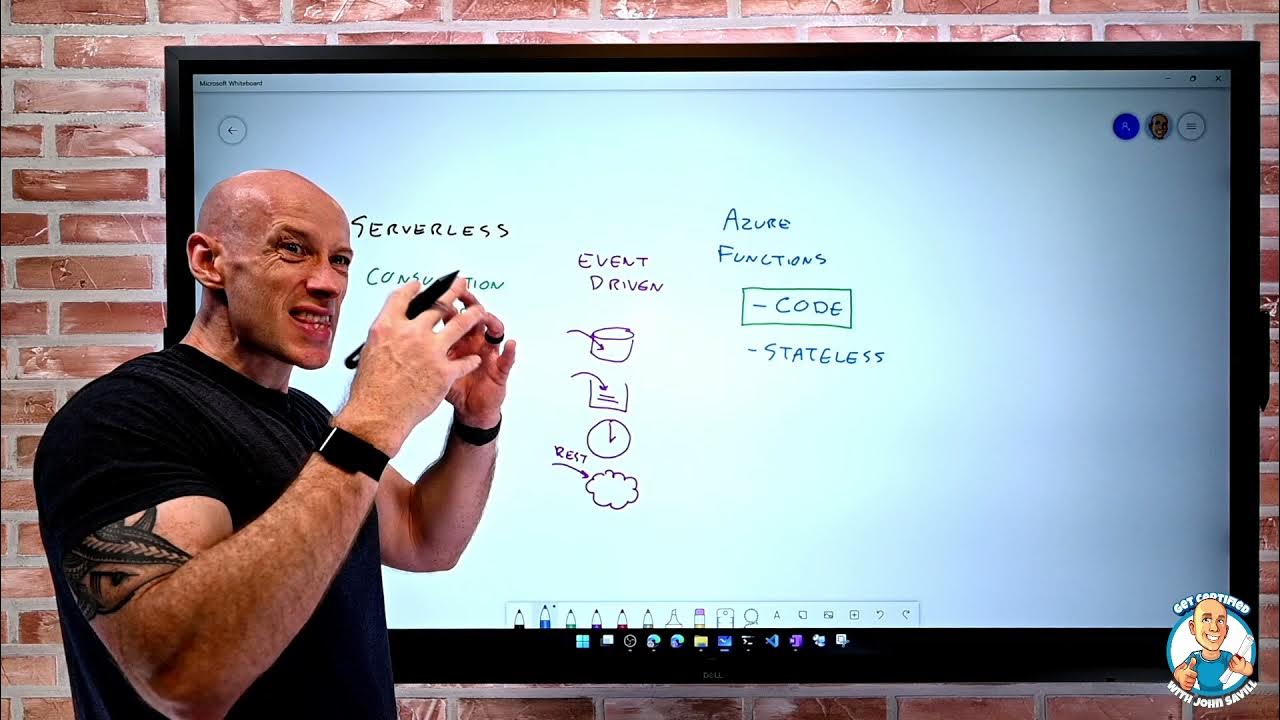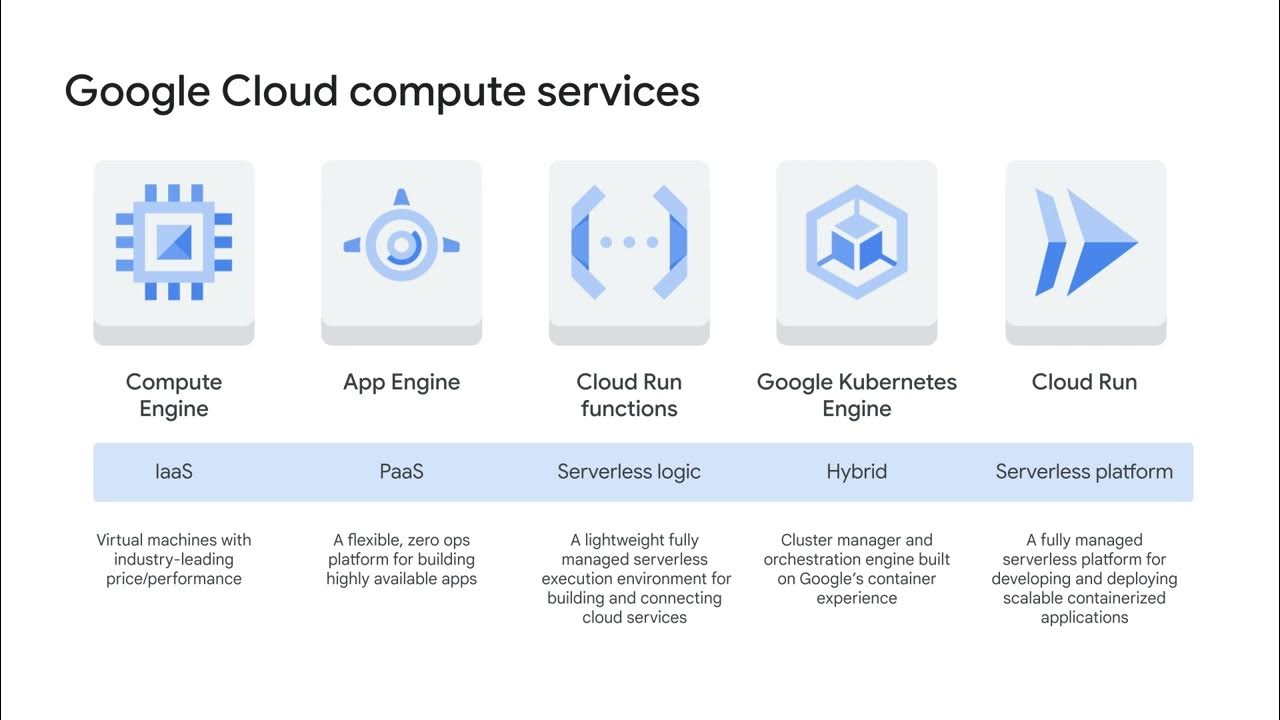Event-Driven Programs with Cloud Run Functions
Summary
TLDRCloud Run functions offer a serverless, event-driven solution for executing small, single-purpose functions triggered by events such as image uploads. These functions allow you to process data (e.g., converting and storing images) without managing servers or runtime environments. They are lightweight, asynchronous, and billed only while active, executing in JavaScript, Node.js, Python, or Go. Cloud events from Cloud Storage and Pub/Sub can trigger functions, or HTTP can be used for synchronous execution, making it ideal for integrating with cloud services and constructing efficient applications.
Takeaways
- 😀 Cloud Run functions provide serverless code that runs based on specific events.
- 😀 Event-driven applications often require tasks like image processing after user uploads.
- 😀 Cloud Run functions allow you to run image processing tasks without managing a server or runtime environment.
- 😀 You can use Cloud Run functions to perform actions like converting images to standard formats, creating thumbnails, and storing files.
- 😀 With Cloud Run functions, you only pay for the compute time your code is running (billed to the nearest 100 milliseconds).
- 😀 These functions are lightweight, asynchronous, and event-based, ideal for small, single-purpose tasks.
- 😀 Cloud Run functions can be triggered by cloud events like uploads from Cloud Storage or Pub/Sub messages.
- 😀 HTTP invocation can also be used for synchronous execution of Cloud Run functions.
- 😀 Supported languages for Cloud Run functions include JavaScript, Node.js, Python, and Go.
- 😀 Cloud Run functions help construct applications using small, reusable pieces of business logic.
- 😀 These functions simplify the connection and extension of various cloud services in a scalable manner.
Q & A
What is Cloud Run Functions?
-Cloud Run Functions is a serverless compute solution that allows you to run code in response to certain events, without the need to manage servers or a runtime environment.
What are some common use cases for event-driven applications?
-A common use case is an application that allows users to upload images. The event of uploading an image could trigger processes like converting the image to a standard format, resizing it for thumbnails, and storing the files in a repository.
How does Cloud Run Functions handle compute resources?
-With Cloud Run Functions, you don't have to manage compute resources. The serverless nature of Cloud Run functions means they automatically scale based on the frequency of events, whether they occur every millisecond or once a day.
What are Cloud Run Functions typically used for?
-Cloud Run Functions are typically used for creating small, single-purpose functions that handle specific tasks in response to events. They can also be used to extend and connect cloud services.
What types of events can trigger Cloud Run Functions?
-Cloud Run Functions can be triggered by events from Cloud Storage, Pub/Sub, or through HTTP invocations, allowing both asynchronous and synchronous execution.
What languages can be used to write Cloud Run Functions?
-Cloud Run Functions can be written in JavaScript, Node.js, Python, or Go, and are executed in a managed Node.js environment on Google Cloud.
How are you billed for Cloud Run Functions?
-You are billed to the nearest 100 milliseconds, but only for the time that your code is running. You do not incur costs for idle time.
What is the main advantage of using Cloud Run Functions over traditional compute resources?
-The main advantage is the serverless nature of Cloud Run Functions, which allows for automatic scaling without the need to manage infrastructure, and you only pay for the actual compute time your code is running.
What kind of compute solution is Cloud Run Functions?
-Cloud Run Functions is a lightweight, event-based, and asynchronous compute solution that enables developers to create small, purpose-driven functions responding to cloud events.
Can Cloud Run Functions be used for both synchronous and asynchronous execution?
-Yes, Cloud Run Functions can be triggered asynchronously by events from Cloud Storage or Pub/Sub, or they can be invoked synchronously via HTTP requests.
Outlines

This section is available to paid users only. Please upgrade to access this part.
Upgrade NowMindmap

This section is available to paid users only. Please upgrade to access this part.
Upgrade NowKeywords

This section is available to paid users only. Please upgrade to access this part.
Upgrade NowHighlights

This section is available to paid users only. Please upgrade to access this part.
Upgrade NowTranscripts

This section is available to paid users only. Please upgrade to access this part.
Upgrade NowBrowse More Related Video

Benefits and Usage of Serverless Technologies - AZ-900 Certification Course

Compute Options in the Cloud

What exactly is the Event Loop in JavaScript? | CodeSketched

AZ-900 Episode 17 | Azure Serverless Computing Services | Functions, Logic Apps, Event Grid

Introduction to AWS Lambda - Serverless Compute on Amazon Web Services

How node JS works | Engineering side
5.0 / 5 (0 votes)